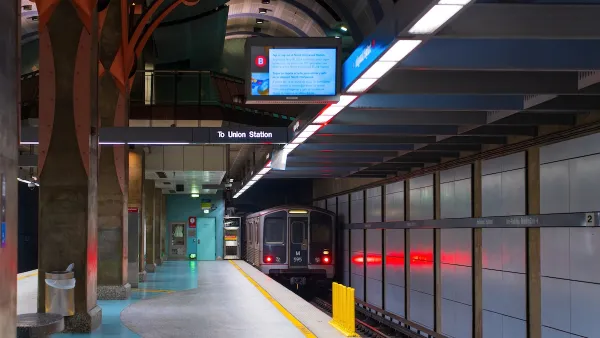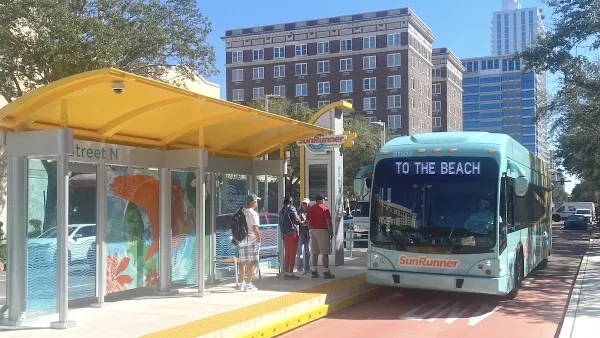Taylor Swift fans are flocking to public transit to attend her concerts, breaking ridership records in cities around the country. Will they keep using transit after the show?

Struggling transit agencies around the country are getting a much-needed boost—if Taylor Swift happens to be playing in their city, that is.
As Jared Brey reports in Governing, Atlanta’s Metropolitan Atlanta Rapid Transit Authority (MARTA) saw triple its normal ridership at the stations surrounding Swift’s concert venue on the weekend she performed. “When Swift played Philadelphia in May, SEPTA, the city's transit system, added late-night trains in its regional rail network, and counted a combined 27,000 fans entering the subway station next to Lincoln Financial Field in the hour after the shows ended.” In Boston, the city sold out of transit tickets for the night of Swift’s show before adding more capacity.
The ridership boost is useful, but do one-off events do anything to improve transit ridership long-term? “What would convert a special-occasion rider into a regular one?” For SEPTA spokesman Andrew Busch, the answer is “a great experience” that includes “everything from frequency, reliability and navigability to cleanliness, good lighting and security presence.”
To accommodate post-pandemic trends, agencies are now looking to increase frequency and service during off-peak travel hours and adapt to provide temporary boosts in service during major special events.
Ultimately, the Swiftie bump is a blip on the radar of transit ridership, but it could convert riders down the line. According to Matthew Dickens, director of policy development and research at the American Public Transportation Association, “big events are a chance to introduce new people to the transit system, and that research shows that people who first use transit when they're young are more likely to ride regularly when they're older.”
FULL STORY: Taylor Swift Fans Give Public Transit a Well-Timed Boost

Maui's Vacation Rental Debate Turns Ugly
Verbal attacks, misinformation campaigns and fistfights plague a high-stakes debate to convert thousands of vacation rentals into long-term housing.

Planetizen Federal Action Tracker
A weekly monitor of how Trump’s orders and actions are impacting planners and planning in America.

Chicago’s Ghost Rails
Just beneath the surface of the modern city lie the remnants of its expansive early 20th-century streetcar system.

Bend, Oregon Zoning Reforms Prioritize Small-Scale Housing
The city altered its zoning code to allow multi-family housing and eliminated parking mandates citywide.

Amtrak Cutting Jobs, Funding to High-Speed Rail
The agency plans to cut 10 percent of its workforce and has confirmed it will not fund new high-speed rail projects.

LA Denies Basic Services to Unhoused Residents
The city has repeatedly failed to respond to requests for trash pickup at encampment sites, and eliminated a program that provided mobile showers and toilets.
Urban Design for Planners 1: Software Tools
This six-course series explores essential urban design concepts using open source software and equips planners with the tools they need to participate fully in the urban design process.
Planning for Universal Design
Learn the tools for implementing Universal Design in planning regulations.
planning NEXT
Appalachian Highlands Housing Partners
Mpact (founded as Rail~Volution)
City of Camden Redevelopment Agency
City of Astoria
City of Portland
City of Laramie





























